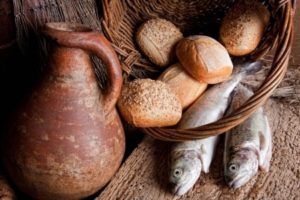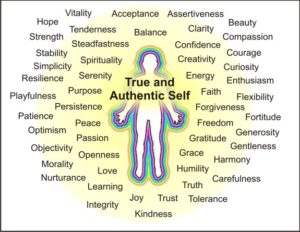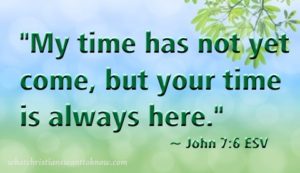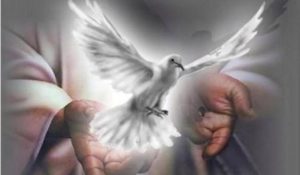 A familiar story indeed, Jesus multiplying loaves of bread and fish to feed five thousand people, but how familiar is it or will it be in our own personal lives?
A familiar story indeed, Jesus multiplying loaves of bread and fish to feed five thousand people, but how familiar is it or will it be in our own personal lives?
Multiplication, that is easy and more powerful than the four other mathematical operations of arithmetic—addition, subtraction, and division. The larger the multiplier and multiplicand, the larger the result!
Easy for Jesus but hard for us especially when it comes to the realities of our life.
Some will point to our heirs, our children, and their children, and our grandchildren and so forth down through the centuries of us being present in life and making an impact in the destiny of the world. Quite egotistical to say the least and meaningless for those that choose not to have children or cannot and choose adoption as a viable alternative.
 But where have we taken a few crumbs and maybe a stinking fish or two and made something of it with our lives?
But where have we taken a few crumbs and maybe a stinking fish or two and made something of it with our lives?
Maybe a business, a legacy trust, or a few trees planted on the land we own?
Or maybe what’s outside us all in the material world is meaningless both in totality and by individual segment?
Maybe we were able to grown something inside ourselves and have it manifested to the outside world or friends, family or strangers through our love?
Where have you witnessed the multiplying effect in your life?
Maybe you performed division instead of multiplication, subtraction instead of addition to downsize and minimize your life from the materialistic world and therein found your peace, joy, unity, and freedom to be simply your True Self?
 No one needs to be a king of anything. Jesus certainly realized this and did not stray from His divine destiny.
No one needs to be a king of anything. Jesus certainly realized this and did not stray from His divine destiny.
After the multiplication, His followers wanted to raise him up in a way different than God had planned.
The people: “This is indeed the Prophet who is to come into the world.”
So when Jesus perceived that they would come to take him by force and make him king, he fled again to the mountain, himself alone.
Sometimes we do need to be alone, to isolate ourselves… from the world but not from God the Father, His Son Jesus Christ or The Holy Spirit. In reality we can never do that as God The Triumvirate is eternally within each of us.
 We can’t be perfect. We can’t be in control of everything. We can’t think in all-or-nothing terms and we can’t be judgmental to be eligible for eternal life. We simply must believe and as Jesus says—“No one can come to me unless the Father who sent me draw him, and I will raise him up on the last day.” The Father draws us near even though we may be trying to draw near to Him. Ultimately it is out of our control to secure everlasting life by ourselves, our thoughts, our words, and our actions.
We can’t be perfect. We can’t be in control of everything. We can’t think in all-or-nothing terms and we can’t be judgmental to be eligible for eternal life. We simply must believe and as Jesus says—“No one can come to me unless the Father who sent me draw him, and I will raise him up on the last day.” The Father draws us near even though we may be trying to draw near to Him. Ultimately it is out of our control to secure everlasting life by ourselves, our thoughts, our words, and our actions.
As for Jesus’ time on the earth, things were getting complicated and confusing:
Brethren (Disciples) to Jesus: “If thou dost these things (works, miracles), manifest thyself to the world.”
 Jesus: “My time has not yet come, but your time is always at hand. The world cannot hate you, but it hates me because I bear witness concerning it, that its works are evil. As for you, go up to the feast, but I do not go up to this feast, for my time is not yet fulfilled.”
Jesus: “My time has not yet come, but your time is always at hand. The world cannot hate you, but it hates me because I bear witness concerning it, that its works are evil. As for you, go up to the feast, but I do not go up to this feast, for my time is not yet fulfilled.”
…then he (Jesus) also went up, not publically, but as it were privately.
People: “Can it be that the rulers have really come to know that this is the Christ? Yet we know where this man is from; but when the Christ comes, no one will know where he is from.”
Jesus: “You both know me, and know where I am from. Yet I have not come of myself, but he is true who has sent me, whom you do not know. I know him because I am from him, and he has sent me.”
 Jesus: “Yet a little while I am with you, and then I go to him who sent me. You will seek me and will not find me; and where I am you cannot come.”
Jesus: “Yet a little while I am with you, and then I go to him who sent me. You will seek me and will not find me; and where I am you cannot come.”
Jesus on the last day of the great feast: “If anyone thirst, let him come to me and drink. He who believes in me, as the Scripture says, ‘From within him there shall flow rivers of living water.’” He said this, however, of the Spirit whom they who believed in him were to receive; for the Spirit had not yet been given, since Jesus had not yet been glorified.
Attendants to the chief priests and Pharisees: “Never has man spoken as this man.”
 Nicodemus: “Does our Law judge a man unless it first give him a hearing, and know what he does?”
Nicodemus: “Does our Law judge a man unless it first give him a hearing, and know what he does?”
Chief priests and Pharisees: “Search the Scriptures and see that out of Galilee arises no prophet.”
And I think there is confusion in the world and in my life today!
Who is Jesus I too would have wondered… where would I have witnessed him in my life back in those days… would I have known how to multiply His blessings and share them with the world back then or even today?

Day 90: Reading The Bible with a TROML Perspective; A Familiar Story but Have You Witnessed Multiplication in Your Life?
Read and inspired by the New Testament, The Gospel of Saint John Chapters 6-7.
Bible Notes:
The Holy Gospel of Jesus Christ according to Saint John
Saint John, the disciple and Apostle whom Jesus loved, was the brother of James and the son of the fisherman Zebedee and Salome.
First a disciple of John the Baptist, he was called to follow Christ.
The purpose of his Gospel he states as follows: “these are written that you may believe the Jesus is the Christ, the Son of God: and that believing you may have life in his name.”
John Chapter 6: A great crowd follows Christ; They do not have sufficient food; Jesus feeds five thousand; They wish to make Christ king; Jesus walks on the water; Jesus in Capharnaum; Jesus promises heavenly bread; The people ask for this bread; Christ is the true bread of life; Christ promises to give His flesh to eat; The Jews wonder; Christ repeats His promise; Many disciples leave Him; The Twelve remain; Judas condemned.
Jesus said to Philip: “Whence shall we buy bread that these may eat?”
But he said this to try him, for he himself knew what he would do.
Philip: “Two hundred denari worth of bread is not enough for them, that each one may receive a little.”
Andrew: “There is a young boy here who has five barley loaves and two fishes; but what are these among so many?”
Jesus: “Make the people recline.”
The men reclined, in number, about five thousand.
Jesus took the loaves, and when he had given thanks, distributed them to those reclining; and likewise the fishes, as much as they wished.
Jesus: “Gather the fragments that are left over; lest they be wasted.”
They therefore gathered them up; and they filled twelve baskets with the fragments of the five barley loaves left over by those who had eaten.
The people: “This is indeed the Prophet who is to come into the world.”
So when Jesus perceived that they would come to take him by force and make him king, he fled again to the mountain, himself alone.
But after they had rowed some twenty-five or thirty stadia, they beheld Jesus walking upon the sea, and drawing near to the boat; and they were frightened. But Jesus said to them, “It is I, do not be afraid.” They desired therefore to take him into the boat; and immediately the boat was at the land towards which they were going.
Wikipedia Notes: Jesus walking on water appears in the gospels of Matthew, Mark, and John, but is not included in the Gospel of Luke. Matthew’s account adds that Peter asked Jesus, “if it is you”, to tell him, or command him, to come to Jesus on the water (waters). In all three accounts, after Jesus got into the ship, the wind ceased and they reached the shore. Only John’s account has their ship immediately reach the shore. Matthew’s and Mark’s accounts end at this point.
And when they found him on the other side of the sea, they (the crowd) said to him, “Rabbi, when didst thou come here?
Jesus: “Amen, amen, I say to you, you seek me, not because you have seen signs, but because you have eaten of the loaves and have been filled. Do not labor for the food that perishes, but that which endures unto the everlasting, which the Son of Man will give you. For upon him the Father, God himself, has set his seal.”
Crowd: “What are we to do that we may perform the works of God?”
Jesus: “This is the work of God, that you believe in him whom he has sent.”
Crowd: “What sign, then, dost thou, that we may see and believe thee? What work dost thou perform? Our fathers ate the manna in the desert, even as it is written, ‘Bread from heaven he gave them to eat.’”
Jesus: “Amen, amen, I say to you, Moses did not give you the bread from heaven, but my Father gives you the true bread from heaven. For the bread of God is that which comes down from heaven and gives life to the world.”
Crowd: “Lord, give us always this bread.”
Jesus: “I am the bread of life. He who comes to me shall not hunger, and he who believes in me shall never thirst. But I have told you that you have seen me and you do not believe. All that the Father gives to me shall come to me, and him who comes to me I will not cast out. For I have come down from heaven, not to do my own will, but the will of him who sent me. Now this is the will of him who sent me, the Father, that I should lose nothing of what he has given me, but that I should raise it up on the last day. For this is the will of my Father who sent me, that whoever beholds the Son, and believes in him, shall have everlasting life, and I will raise him up on the last day.”
Crowd: “is this not Jesus the son of Joseph, whose father and mother we know? How then does he say, ‘I have come down from heaven?’
Jesus: “Do not murmur among yourselves. No one can come to me unless the Father who sent me draw him, and I will raise him up on the last day. It is written in the Prophets, ‘And they shall be taught of God.’ Everyone who has listened to the Father, and has learned, comes to me; not that anyone has seen the Father except him who is from God, he has seen the Father. Amen, amen, I say to you, he who believes in me has life everlasting.”
Jesus continues: “I am the bread of life. Your fathers ate the manna in the desert, and have died. This is the bread that comes down from heaven, so that if anyone eat of it he will not die. I am the living bread that has come down from heaven. If anyone eat of this bread he shall live forever; and the bread that I will give is my flesh for the life of the world.”
Crowd: “How can this man give us his flesh to eat?”
Jesus: “Amen, amen, I say to you, unless you eat the flesh of the Son of Man, and drink his blood, you shall not have life in you. He who eats my flesh and drinks my blood has life everlasting and I will raise him up on the last day. For my flesh is food indeed, and my blood is drink indeed. He who eats my flesh and drinks my blood, abides in me and I in him. As the living Father has sent me, and as I live because of the Father, so he who eats me, he shall also live because of me. This is the bread that has come down from heaven; not as your fathers ate the manna, and died. He who eats this bread shall live forever.”
Crowd: “This is a hard saying. Who can listen to it?”
Jesus: “Does this scandalize you? What then if you should see the Son of Man ascending where he was before? It is the spirit that gives life, the flesh profits nothing. The words that I have spoken to you are spirit and life. But there are some among you who do not believe. This is why I have said to you, ‘No one can come to me unless he is enabled to do so by my Father.”
For Jesus knew from the beginning who they were who did not believe, and who it was who should betray him. From this time many of his disciples turned back and no longer went about him.
Jesus, therefore said to the Twelve: “Do you also wish to go away?
Simon Peter: “Lord, to whom shall we go? Thou hast words of everlasting life, and we have come to believe and to know that thou art the Christ, the Son of God.”
Jesus: “Have I not chosen you, the Twelve? Yet one of you is a devil.”
John Chapter 7: The disciples ask Jesus to go to Judea; He sends them ahead; He follows secretly; Jesus goes to the Temple; The source of Christ’s teachings; Justification for curing on the Sabbath; Christ’s origin; attempt to seize Christ; Jesus to leave soon; Jesus claims to be the fountain of life; The crowd is hesitant; The Pharisees condemn Jesus; Nicodemus asks for a hearing.
Jewish Feast of Tabernacles (Wiki: During the existence of the Jerusalem Temple, it was one of the Three Pilgrimage Festivals on which the Israelites were commanded to perform a pilgrimage to the Temple.)
Jesus did not wish to go about in Judea because the Jews were seeking to put him to death.
Brethren (Disciples) to Jesus: “If thou dost these things (works, miracles), manifest thyself to the world.”
Jesus: “My time has not yet come, but your time is always at hand. The world cannot hate you, but it hates me because I bear witness concerning it, that its works are evil. As for you, go up to the feast, but I do not go up to this feast, for my time is not yet fulfilled.”
…then he (Jesus) also went up, not publically, but as it were privately.
Others (said about Jesus): “No rather he seduces the crowd.” Yet for fear of the Jews no one spoke openly of him.
When, however, the feast was already half over, Jesus went up into the temple and began to teach. And the Jews marveled, saying, “How does this man come by learning, since he has not studied.”
Jesus: “My teaching is not my own, but his who sent me. If anyone desires to do his will, he will know of the teaching whether it is from God, or whether I speak of my own authority. He who speaks on his own authority seeks his own glory. But he who seeks the glory of the one who sent him is truthful, and there is no injustice in him. Did not Moses give you the Law, and none of you observes the Law? Why do you seek to put me to death?”
Crowd answered: “Thou hast a devil. Who seeks to put thee to death?”
Jesus: “One work I did and you all wonder. For this reason Moses gave you the circumcision”—not that it was from Moses, but from your fathers—“and on a Sabbath you circumcise a man. If a man receives circumcision on a Sabbath, that the Law of Moses may not be broken, are you indignant with me because I made a whole man well on a Sabbath? Judge not by appearances but give just judgment.”
People: “Can it be that the rulers have really come to know that this is the Christ? Yet we know where this man is from; but when the Christ comes, no one will know where he is from.”
Jesus: “You both know me, and know where I am from. Yet I have not come of myself, but he is true who has sent me, whom you do not know. I know him because I am from him, and he has sent me.”
Jesus: “Yet a little while I am with you, and then I go to him who sent me. You will seek me and will not find me; and where I am you cannot come.”
Jesus on the last day of the great feast: “If anyone thirst, let him come to me and drink. He who believes in me, as the Scripture says, ‘From within him there shall flow rivers of living water.’” He said this, however, of the Spirit whom they who believed in him were to receive; for the Spirit had not yet been given, since Jesus had not yet been glorified.
Attendants to the chief priests and Pharisees: “Never has man spoken as this man.”
Nicodemus: “Does our Law judge a man unless it first give him a hearing, and know what he does?”
Chief priests and Pharisees: “Search the Scriptures and see that out of Galilee arises no prophet.”

Speak Your Mind